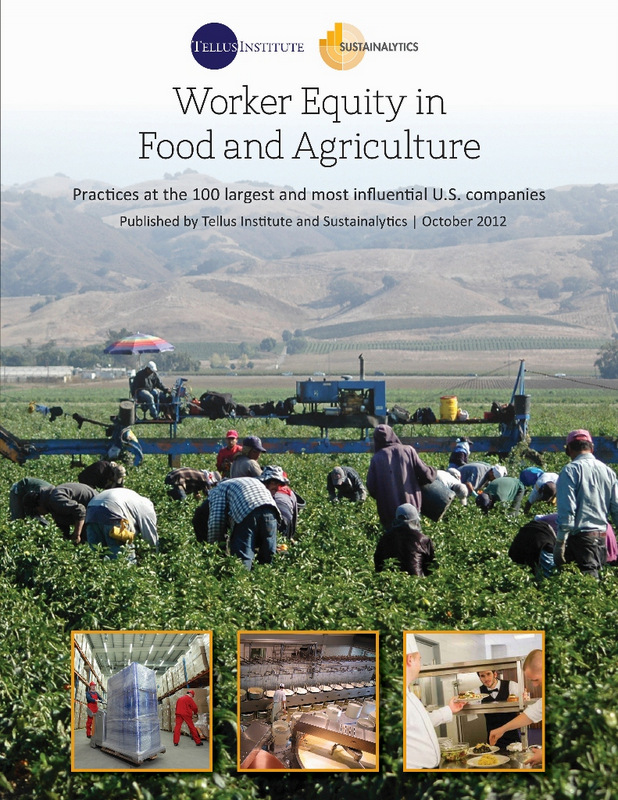Locally Grown Food is Often Not Ethically Grown, Produced, and Delivered
New Report Explores Worker Welfare Practices at the 100 Largest and Most Influential U.S. Companies.
Published 10-29-12
Submitted by Tellus Institute
 New report assesses key areas of worker equity performance.
New report assesses key areas of worker equity performance. The organic, local, natural food movement has a glaring blind spot: worker welfare. Despite popular assumptions, foods that are sustainable, organic, or locally grown are often produced under highly inequitable working conditions. In fact, workers that produce and deliver food to consumers face some of the lowest paying jobs, the highest levels of food insecurity, and some of the most dangerous working conditions in the U.S.
The new report Worker Equity in Food and Agriculture, by Tellus Institute and Sustainalytics, explores this commonly overlooked issue of worker welfare practices at the 100 largest and most influential U.S. companies. Supported by the Rockefeller Foundation, the report assesses key areas of worker equity performance, including: company oversight and disclosure; labor policies and practices; worker compensation; health and safety; and treatment of contractors and supply chain workers. Company practices in these areas are explored across the food value chain – from production and distribution to of food to retail sales and restaurants. Among key findings:
- Fewer than one in five companies shows evidence of having a high-level committee tasked specifically with oversight of worker equity issues. Managing supply chain risks at overseas operations tends to take precedence over local oversight of employees and contractors.
- Compared to other frontline workers in the U.S., food industry workers earn about one-third less – only $18,900 per year. Many food workers lack the rudimentary protections of wage and hour laws.
- Some of the most dangerous jobs in the U.S. are found in the food industry. While the fatality rate for all industries is 3.5 per 100,000 workers, in agriculture the rate is over 25, and for warehousing and transportation jobs it is 15.
- The prevalent cost-cutting model across the industry increases risks to workers and to food safety; preliminary findings suggest a direct correlation between worker equity and food safety.
Report co-author Heather Lang, Director of Research Products, North America, at Sustainalytics notes: “This study sends a critical overriding message to companies, investors and other key stakeholders: the time has come to get worker equity data out of the shadows. While companies have made considerable strides in oversight and disclosure of environmental performance, key areas of social impact remain neglected, unquantified, and difficult to assess.”
“When you pull back the veil on working conditions in the food industry, what you find is distressing,” said Marjorie Kelly, Fellow at Tellus Institute and report co-author. “But there is anecdotal evidence that high-road practices benefit not only workers but also companies, through improved morale, reduced turnover, fewer labor disputes, higher product quality, and enhanced customer service. We hope to see more research into the business case for improved worker equity practices.”
Worker Equity in Food and Agriculture: Practices at the 100 largest and most influential U.S. companies is available online today at www.sustainalytics.com/publications or at www.tellus.org.
A joint webinar on the report, featuring Heather Lang and Marjorie Kelly, will take place on Tuesday, November 13, 2012 at 1PM Eastern time.
To register for this Webinar click the link below:
https://www1.gotomeeting.com/register/540061904
About Sustainalytics
Sustainalytics is an award-winning provider of environmental, social and governance (ESG) research and analysis, and responsible investment services. Offering customized responsible investment solutions to both values-based and mainstream investors, Sustainalytics also provides a global perspective underpinned by local experience and expertise.
About Tellus Institute
Tellus Institute is a 35-year-old nonprofit research and consulting organization working for a Great Transition to a just, fair, and sustainable economy, with a staff of specialists in corporate social responsibility, impact investing, ecological science, and community well-being.


